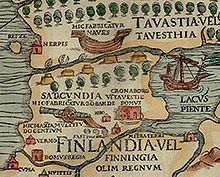Etymology of Finland
Finland
The earliest written appearance of the name Finland is thought to be on three runestones. Two were found in the Swedish province of Uppland and have the inscription finlonti. The third was found in Gotland. It has the inscription finlandi and dates back to the 13th century. The name can be assumed to be related to the tribe name Finns, of which the first known record is from AD 98.

Suomi
The name Suomi (Finnish for 'Finland') has uncertain origins, but a common etymology with saame (the Sami, the native people of Lapland) and Häme (a province in the inland) has been suggested (Proto-Finnic *hämä from older *šämä, possibly loaned into Proto-Saami as *sāmē), whose source could be the Proto-Baltic word *źemē, meaning '(low) land'. According to the hypothesis, *sāmē – or *šämä directly – was loaned back into Baltic as *sāma- (compare Latvian sāms 'Finn, Öselian'), from which Northern Finnic reborrowed it (perhaps via a Germanic intermediate *sōma-) as *sōma- > *sōme- 'Finland'. In addition to the close relatives of Finnish (the Finnic languages), this name is also used in the Baltic languages Latvian (soms, Somija) and Lithuanian (suomis, Suomija), although these are evidently later borrowings. An alternative hypothesis by Petri Kallio suggests the Proto-Indo-European word *(dʰ)ǵʰm-on- 'human' (cf. Gothic guma, Latin homo), being borrowed into Uralic as *ćoma.
It has been suggested that the Finnish word Suomi is first attested in the Royal Frankish Annals in 811 as the name of a person in the Danish delegation to a peace treaty with the Franks. If so, it is also the earliest evidence for the change from the proto-Finnic monophthong /oː/ to the Finnish diphthong /uo/. However, some historical linguists view this interpretation of the name as unlikely, supposing another etymology or that the spelling originated as a scribal error (in which case the sound-change /oː/ > /uo/ could have happened much later).
Concept
In the earliest historical sources, from the 12th and 13th centuries, the term Finland refers to the coastal region around Turku from Perniö to Uusikaupunki. This region later became known as Finland Proper in distinction from the country name Finland. Finland became a common name for the whole country in a centuries-long process that started when the Catholic Church established a missionary diocese in Nousiainen in the northern part of the province of Suomi possibly sometime in the 12th century.
The devastation of Finland during the Great Northern War (1714–1721) and during the Russo-Swedish War (1741–1743) caused Sweden to begin carrying out major efforts to defend its eastern half from Russia. These 18th-century experiences created a sense of a shared destiny that when put in conjunction with the unique Finnish language, led to the adoption of an expanded concept of Finland.
Comments
Post a Comment